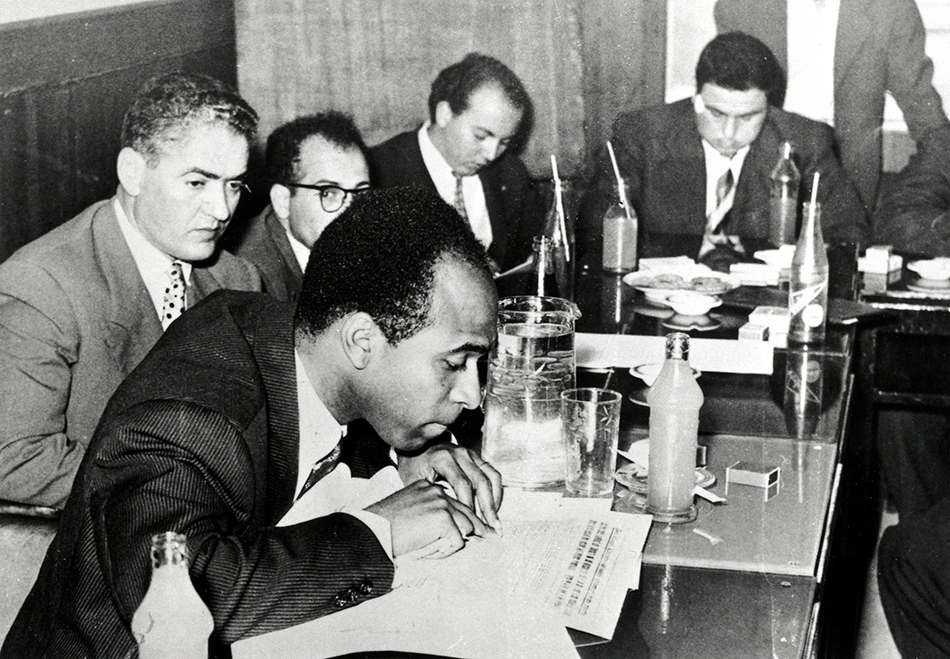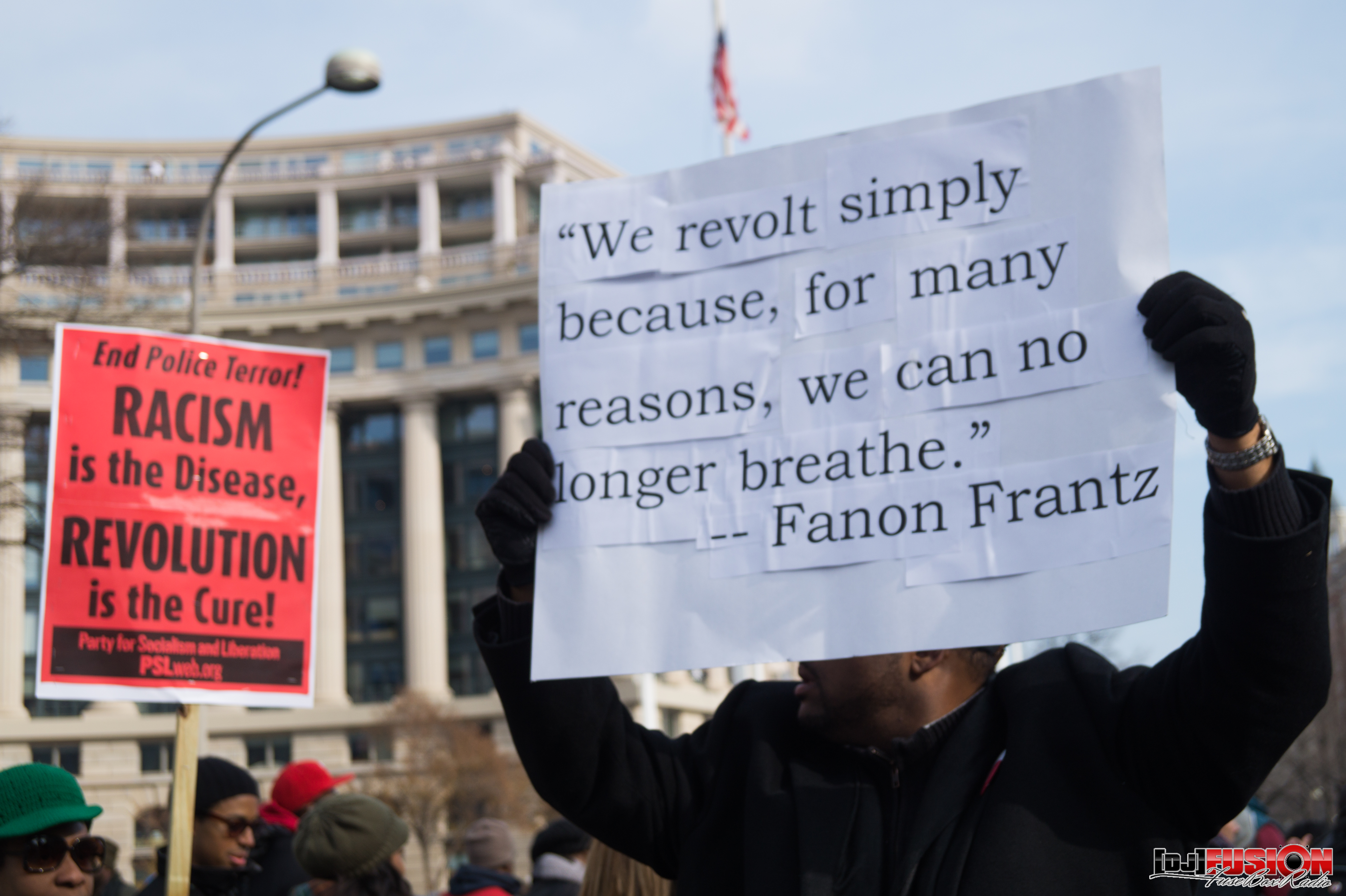Exploring Frantz Fanon’s Legacy: Anti-Colonial Thought, Psychological Impacts of Colonialism, and Modern Racial Dynamics
By Darius Spearman (africanelements)
Support African Elements at patreon.com/africanelements and hear recent news in a continuous playlist. Additionally, you can gain early access to ad-free video content.
“He who is reluctant to recognize me opposes me.”
– Frantz Fanon
Unveiling Frantz Fanon: Revolutionary Psychiatrist, Anti-Colonial Theorist, and Influential Marxist Thinker
Frantz Fanon, a pivotal figure in West Indian psychiatry and revolutionary thought, significantly influenced post-colonial discourse and anti-colonial movements. Additionally, his work intricately explores the psychological and sociopolitical dimensions of colonialism, race, and liberation. Fanon was a Francophone Afro-Caribbean psychiatrist, political philosopher, and Marxist from the French colony of Martinique. Moreover, he was a prominent figure in the anti-colonial movements of the mid-20th century.
Fanon was born in 1925 in Martinique, a French colony at the time. Later, he studied psychiatry in France and subsequently worked as a psychiatrist in Algeria during the Algerian War of Independence against French colonial rule. Fanon’s experiences of racism in the French army during World War II and his work treating Algerian patients shaped his radical anti-colonial views. Consequently, he joined the Algerian liberation movement and worked as an editor for the revolutionary newspaper Al Moujahid.

Fanon’s writings were influential in the fields of post-colonial studies, critical theory, and Marxism. Furthermore, he argued that decolonization required a complete overhaul of the colonial system and the creation of a “new man” free from the psychological impacts of colonialism. Additionally, Fanon’s major works include Black Skin, White Masks (1952), which explored the psychological impact of colonialism on the colonized, and The Wretched of the Earth (1961), a seminal text on decolonization and the use of violence against colonial oppression.

This analysis integrates diverse scholarly perspectives and delves into Fanon’s central themes, including racial interpellation, the ethical justification of anti-colonial violence, and his vision for a liberated society.
Ethical Justification of Anti-Colonial Violence
“Violence is a man recreating himself.”
– Frantz Fanon
One of Fanon’s most controversial yet central themes is the ethical justification of violence in the context of colonial oppression. However, as Fashina (1989) elucidates, Fanon viewed violence as necessary and inevitable. He saw violence as a required response to the systemic and brutal oppression inherent in colonial rule. According to Fashina,
“Fanon posits that colonial violence is a dehumanizing force, and the colonized’s violent resistance is a form of reclamation of their humanity.” (Fashina 170-185)
Consequently, this perspective is crucial in understanding colonial power dynamics and the resistance it engenders.
Fanon on Race and Nation
Frantz Fanon’s perspectives on race and nation provide a nuanced understanding of post-colonial identity formation. Additionally, according to Nursey-Bray (1980), Fanon believed that the colonial context forced a distorted view of self among colonized individuals. Moreover, he argued that liberation from colonial rule must include a reclamation and reformation of national identity. Furthermore, Nursey-Bray highlights, “Fanon perceives national culture as a call to arms, where cultural identity serves as a cornerstone in the fight against colonial domination” (Nursey-Bray, 56). Consequently, this reflection underscores Fanon’s insight into the interconnectedness of race, culture, and national identity in the post-colonial context.
Fanon and the African Revolution
Fanon’s role in the Algerian War and his broader impact on anti-colonial movements worldwide are significant. Moreover, Grohs (1968) elaborates on how Fanon’s experiences in Algeria shaped his views on colonialism and revolution. Additionally, he became an ardent advocate for the Algerian independence movement, seeing it as a microcosm of broader anti-colonial struggles. Furthermore, “Grohs indicates that for Fanon, Algeria was not just a case study but a symbol of anti-colonial resistance and the hope for a decolonized world” (Grohs, 39). Consequently, this perspective demonstrates Fanon’s deep engagement with and influence on revolutionary movements beyond his theoretical writings.
Fanon, Sartre, and Agency
The relationship between Fanon and Jean-Paul Sartre reveals critical insights into Fanon’s philosophical underpinnings, especially concerning the concept of agency. Bernasconi (2004) also discusses how Fanon’s interaction with Sartre’s existentialist philosophy helped shape his thoughts on freedom and agency in the colonial context. Moreover, “Bernasconi explains that Fanon, diverging from Sartre, saw freedom not just as an individual pursuit but intrinsically linked with collective liberation from colonialism” (Bernasconi, 77). Consequently, this aspect of Fanon’s thought highlights the importance of collective agency in the struggle against colonialism.
Intersection with Current Racial Dynamics and Social Justice Movements
Frantz Fanon’s theories on racial dynamics are profoundly relevant to contemporary social justice movements. His analysis of the psychological effects of racism offers a vital lens for understanding and combating modern racial prejudices. For instance, Fanon notes:
“The oppressed will always believe the worst about themselves” (Fanon, “Black Skin, White Masks,” p. 82).
This quote underscores the deep psychological impact of racism, an essential consideration for current social justice efforts aimed at dismantling systemic racism.
Fanon’s Ideas on Violence and Modern Anti-Colonial Strategies
Fanon’s stance on violence in anti-colonial struggles provides a thought-provoking perspective for today’s resistance movements. For instance, the discussion of violence as a response to colonial oppression remains a topic of debate and reflection. He asserts:
“At the individual level, violence is a cleansing force. It frees the native from his inferiority complex and from his despair and inaction; it makes him fearless and restores his self-respect” (Fanon, “The Wretched of the Earth,” p. 51).

While the context and forms of resistance have evolved, Fanon’s insights into the dynamics of oppression and liberation remain relevant.
Fanon on Culture and National Identity in Post-colonial Nations
Fanon’s thoughts on culture and national identity are crucial in the context of post-colonial nations. For example, he believed that the process of decolonization must include cultural and psychological liberation. Fanon emphasizes:
“National culture in the underdeveloped countries, therefore, must lie at the very heart of the liberation struggle these countries are waging” (Fanon, “The Wretched of the Earth,” p. 178).
This perspective is invaluable for post-colonial nations as they work to reclaim and redefine their identities independent of colonial narratives.
Racial Interpellation and the Case of Trayvon Martin
In contemporary times, Frantz Fanon’s concept of racial interpellation remains highly relevant. Furthermore, racial interpellation refers to the process by which individuals are assigned racial identities and subjectivities through social institutions and interactions. Instead of individuals freely constructing their own racial identities, racial interpellation is the mechanism by which pre-existing social structures and institutions “constitute” or shape individuals’ racial identities and prejudices.
Racial interpellation subjects individuals to a “racialized gaze” that views them as inherently problematic or incapable of representing their true selves. Consequently, this makes it difficult for racialized individuals to resist this imposed identity. Moreover, it can also subject white individuals to certain racial categorizations based on appearance, showing how it operates beyond just non-white individuals. Thus, the process of racial interpellation maintains social hierarchies and inequalities by encouraging individuals to accept their assigned racial identities and positions within society.
In summary, racial interpellation is the way social structures and institutions shape and constrain individuals’ racial subjectivities, often in ways that reproduce racial inequalities and hierarchies.
The tragic case of Trayvon Martin powerfully encapsulates the ongoing relevance of Fanon’s ideas in understanding and combating racial stereotypes in contemporary society. Adjei (2013) draws a direct line from Fanon’s theories to the racial dynamics evident in Martin’s case. He discusses how societal stereotypes and prejudices about black individuals influenced the tragic events. Adjei quotes:
The racial interpellation in Trayvon Martin’s case is a modern reflection of Fanon’s theories. The societal presumption of black men as inherently dangerous led to Martin’s untimely demise, echoing Fanon’s assertion of the black man’s experience in a white-dominated world” (Adjei, 91).
Several key points illustrate the process by which individuals are socially constructed as racial subjects:
- The Trayvon Martin case was “about race” from the moment George Zimmerman decided, against the instructions of police, to pursue an unarmed black teenager through a Florida gated community because of his supposed resemblance to African Americans. In other words, Zimmerman racially interpellated Martin as a criminal threat based on his race.
- The criminal justice system has historically treated African Americans more harshly as suspects and offenders while taking their victimization less seriously. That is to say, the “presumption of black criminality” meant that Martin’s violent death could be “explained away” by Zimmerman’s claim of self-defense. Put differently, the criminal justice system racially interpellates Black individuals as inherently criminal.
- The “colorblind narrative” that dominated the Zimmerman trial forced the prosecution to avoid discussing racial profiling and instead describe Zimmerman’s actions as “criminal profiling.” Essentially, the legal system racially interpellates individuals by restricting discussions of race.
Ultimately, the Trayvon Martin case reveals how race is socially constructed and how individuals are interpellated as racial subjects, with serious consequences, within the criminal justice system and broader society.
The Enduring Relevance of Fanon
In summary, Frantz Fanon was a pioneering thinker and activist who contributed significantly to anti-colonial theory and the struggle for decolonization in the mid-20th century. Fanon died in 1961 at the early age of 36 from leukemia. Nevertheless, his works continue to be highly influential in post-colonial studies and critical theory.
Frantz Fanon’s work offers profound insights into the dynamics of colonialism, racial identity, and the liberation struggle. With its enduring relevance, Fanon’s work continues to inform and inspire discussions on race, identity, and liberation, offering critical insights into the ongoing struggles for racial equality and decolonization.
Fanon’s ideas continue to resonate in modern discourses, from his examination of violence in anti-colonial movements to his views on national identity and cultural agency. The tragic case of Trayvon Martin, analyzed through the lens of Fanon’s theories, highlights the persistent challenges of racial interpellation in contemporary society. Fanon’s legacy thus remains in the realms of post-colonial and psychological theory and the ongoing struggles against racial injustice and inequality in our time.
About the author
Darius Spearman is a professor of Black Studies at San Diego City College since 2007. He has authored several books, including Between The Color Lines: A History of African Americans on the California Frontier Through 1890. You can visit Darius online at africanelements.org.
Works Cited
Adjei, Paul Banahene. “Racial Interpellation and Racial Violence: The Killing of Trayvon Martin.” Journal of Black Studies, vol. 44, no. 8, 2013, pp. 797-821.
Bernasconi, Robert. “Fanon and Sartre 50 Years On.” Sartre Studies International, vol. 10, no. 2, 2004, pp. 139-155.
Fanon, Frantz. Black Skin, White Masks. Translated by Charles Lam Markmann, Grove Press, 1967.
Fanon, Frantz. The Wretched of the Earth. Translated by Constance Farrington, Grove Press, 1963.
Fashina, Olatunde. “Fanon: The Ethical Justification of Anti-Colonial Violence.” Third World Quarterly, vol. 11, no. 4, 1989, pp. 170-185.
Grohs, Gerhard. “Frantz Fanon and the African Revolution.” Journal of Modern African Studies, vol. 6, no. 4, 1968, pp. 503-518.
Nursey-Bray, Paul. “Frantz Fanon: The Struggle for Inner Liberation.” Arena, no. 54, 1980, pp. 48-62.
